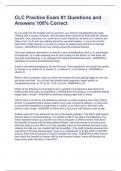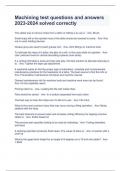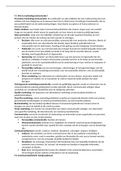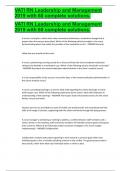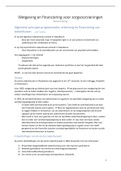Lecture 1 11/11/2024
Although consumption is a critical determinant of consumer well-being in many western
societies consumption comes with many problems in, food, healthcare, animal welfare,
environment, pesticides, child labour, food waste, labor conditions etc. Many planetary
boundaries get crossed.
UN SDG’s (Sustainable Development Goals)
● No poverty
● Zero hunger
● Good health and well-being
● Quality education
● Gender equality
● Clean water and sanitation
● Affordable and clean energy
● Decent work and economic growth
● Industry, innovation and infrastructure
● Reduced inequalities
● Sustainable cities and communities
● Responsible consumption and production
● Climate action
● Life below water
● Life on land
● Peace, justice and strong institutions
● Partnerships for the goals
Contradictio in terminis Marketing and consumer well-being seem at first initially
contradict each other because marketing is often
associated with the pursuit of profit and sales, sometimes
at the expense of consumer well-being. But why is
marketing seen as a negative discipline? Marketing can
help improve societal and consumer well-being. But to
persuade people in a good way you need theoretical
background and/or scientific evidence.
Marketers who take the well-being of consumers at heart can improve their own financial
well-being as well as the well-being of consumers. With marketing we can resolve problems like
environmental problems and health issues. Marketing can make a difference.
,Marketing 1937 Business activities involved in the flow of goods and
services from production to consumption (American
Marketing Association 1937). This definition was only
defined from a company perspective, totally ignoring
consumer well-being.
2007 Marketing is the activity, set of institutions, and processes
for creating, communicating, delivering, and exchanging
offerings that have value for customers, clients, partners,
and society at large (American Marketing Association
2007). Over time the definition is changed more to a
consumer perspective combined with a company
perspective.
Consumer behavior is about:
● The purchase process/decision making
● Consumption, like preparation (making too much food → eating too much/leftovers) Over
consuming is also a sort of food waste.
● Disposal, (refurbished phones, packaging waste)
This is all relevant in stores, home, work, restaurants, schools
Two broad perspectives on consumer well-being
● Hedonic perspective
● Eudaimonic perspective
→ The hedonic perspective focuses on happiness and defines consumer well-being in
terms of pleasure attainment and pain avoidance.
→ The eudaimonic perspective focuses on the actualization of human potentials and
defines consumer well-being in terms of the degree to which people are realizing their
true nature.
Questions that arise with consumer well-being
● Why do we eat chips, why do we fly so much, we continuously decide between trade offs
between health/sustainability and our own happiness.
● How can we limit the costs of our happiness?
Who is to blame for the negative consequences of overconsumption?
● Can we blame Marketing?
● Can marketers make you purchase ideas, goods, or services that you do not want or
need?
, List of arguments that might be (partly) true that marketing is to blame for overconsumption:
● Marketing get consumers to want and spend more than they can afford (via credit cards,
loans)
● Marketers are skilled at creating brand differentiation among product that are essentially
homogeneous
● Marketers want to produce and sell more goods without considering the resource and
environmental costs
● Marketing had not paid enough attention to product safety until the likes or Ralph Nader
appeared
● Marketers favor giving the public what it want whether it is good or bad for them
● Marketers promote a materialistic mindset
● Marketers rarely talk about sane consumption
● Marketers are increasing their information about each of us
→ Marketing also did a lot of good, Marketers figured out which consumers wants and
needs can be satisfied with certain items, making their lives easier and more satisfying.
Means-End chain theory
We live our lives driven by a very limited set of values that we find important. The set of values
that we have are very similar, but the importance that individuals attach to values differ. The
means-end chain theory basically suggests that if you look at attributes of a product for example
a no pesticide food, do we buy the food because of no pesticide? No, we buy the food because
we think it’s natural. Because of the natural attributes we sense it has a higher quality and we
think that that is healthy for us. The main reasons we buy the food are our values, good health
and long life. These are our drivers for buying.
Corporate social responsibility A firm’s commitment to ensure societal and stakeholder
wellbeing through discretionary business practices and
contributions of corporate resources
Although consumption is a critical determinant of consumer well-being in many western
societies consumption comes with many problems in, food, healthcare, animal welfare,
environment, pesticides, child labour, food waste, labor conditions etc. Many planetary
boundaries get crossed.
UN SDG’s (Sustainable Development Goals)
● No poverty
● Zero hunger
● Good health and well-being
● Quality education
● Gender equality
● Clean water and sanitation
● Affordable and clean energy
● Decent work and economic growth
● Industry, innovation and infrastructure
● Reduced inequalities
● Sustainable cities and communities
● Responsible consumption and production
● Climate action
● Life below water
● Life on land
● Peace, justice and strong institutions
● Partnerships for the goals
Contradictio in terminis Marketing and consumer well-being seem at first initially
contradict each other because marketing is often
associated with the pursuit of profit and sales, sometimes
at the expense of consumer well-being. But why is
marketing seen as a negative discipline? Marketing can
help improve societal and consumer well-being. But to
persuade people in a good way you need theoretical
background and/or scientific evidence.
Marketers who take the well-being of consumers at heart can improve their own financial
well-being as well as the well-being of consumers. With marketing we can resolve problems like
environmental problems and health issues. Marketing can make a difference.
,Marketing 1937 Business activities involved in the flow of goods and
services from production to consumption (American
Marketing Association 1937). This definition was only
defined from a company perspective, totally ignoring
consumer well-being.
2007 Marketing is the activity, set of institutions, and processes
for creating, communicating, delivering, and exchanging
offerings that have value for customers, clients, partners,
and society at large (American Marketing Association
2007). Over time the definition is changed more to a
consumer perspective combined with a company
perspective.
Consumer behavior is about:
● The purchase process/decision making
● Consumption, like preparation (making too much food → eating too much/leftovers) Over
consuming is also a sort of food waste.
● Disposal, (refurbished phones, packaging waste)
This is all relevant in stores, home, work, restaurants, schools
Two broad perspectives on consumer well-being
● Hedonic perspective
● Eudaimonic perspective
→ The hedonic perspective focuses on happiness and defines consumer well-being in
terms of pleasure attainment and pain avoidance.
→ The eudaimonic perspective focuses on the actualization of human potentials and
defines consumer well-being in terms of the degree to which people are realizing their
true nature.
Questions that arise with consumer well-being
● Why do we eat chips, why do we fly so much, we continuously decide between trade offs
between health/sustainability and our own happiness.
● How can we limit the costs of our happiness?
Who is to blame for the negative consequences of overconsumption?
● Can we blame Marketing?
● Can marketers make you purchase ideas, goods, or services that you do not want or
need?
, List of arguments that might be (partly) true that marketing is to blame for overconsumption:
● Marketing get consumers to want and spend more than they can afford (via credit cards,
loans)
● Marketers are skilled at creating brand differentiation among product that are essentially
homogeneous
● Marketers want to produce and sell more goods without considering the resource and
environmental costs
● Marketing had not paid enough attention to product safety until the likes or Ralph Nader
appeared
● Marketers favor giving the public what it want whether it is good or bad for them
● Marketers promote a materialistic mindset
● Marketers rarely talk about sane consumption
● Marketers are increasing their information about each of us
→ Marketing also did a lot of good, Marketers figured out which consumers wants and
needs can be satisfied with certain items, making their lives easier and more satisfying.
Means-End chain theory
We live our lives driven by a very limited set of values that we find important. The set of values
that we have are very similar, but the importance that individuals attach to values differ. The
means-end chain theory basically suggests that if you look at attributes of a product for example
a no pesticide food, do we buy the food because of no pesticide? No, we buy the food because
we think it’s natural. Because of the natural attributes we sense it has a higher quality and we
think that that is healthy for us. The main reasons we buy the food are our values, good health
and long life. These are our drivers for buying.
Corporate social responsibility A firm’s commitment to ensure societal and stakeholder
wellbeing through discretionary business practices and
contributions of corporate resources

